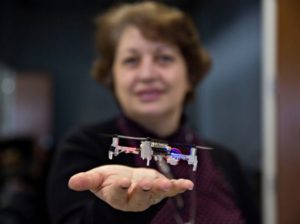
University of Illinois Urbana-Champaign researcher Naira Hovakimyan recently earned a $1.5 million grant from the National Science Foundation to “fund the development of robots that can assist the elderly with daily tasks.” Many of her robotic concepts include the use of autonomous drones.
According to a recent report in the New York Times, Hovakimyan experiments with drones she has dubbed “‘Bibbidi Bobbidi Bots,” borrowing a phrase from the Cinderella movie, to make them seem less intimidating.”
“I’m convinced that within 20 years drones will be today’s cellphones,” she said in a recent interview with the Australian Financial Review.
Hovakimyan has partnered with Nicer Robotics laboratory in a project that employs Oculus Rift virtual reality viewers allowing users to experience “how it might feel to be close to a small drone. She believes that drones could ultimately be used to perform all manner of household chores, like reaching under a table to grab an object, cleaning chandeliers and weeding the lawn.”
And make no mistake, the demand for robotic helpers – especially flying drones – will be especially obvious in a few decades. The Daily Mail predicts that “the number of older adults in the world is continually rising. By 2050, the number of people 60 and over is expected to double globally, and triple by 2100.”
Hovakimyan’s project has been dubbed Automation Supporting Prolonged Independent Residence for the Elderly (ASPIRE) and its end goal is certainly a worthy one to aspire. Her drones will be “trained” to perform cleaning tasks and even deliver medication to the elderly.
While the idea of a drone swarm hovering around grandma’s house may make some uncomfortable, having autonomous servants in the air is certainly a better alternative in terms of allowing the elderly to maintain a measure of personal independence.
“The idea is that if we get technologically equipped houses, people will most likely enjoy their independent life in their home as opposed to going to a nursing home, where things will be overstuffed and understaffed,” Hovakimyan said.
Jason is a longstanding contributor to DroneLife with an avid interest in all things tech. He focuses on anti-drone technologies and the public safety sector; police, fire, and search and rescue.
Beginning his career as a journalist in 1996, Jason has since written and edited thousands of engaging news articles, blog posts, press releases and online content.
Email Jason
TWITTER:@JasonPReagan
Subscribe to DroneLife here.